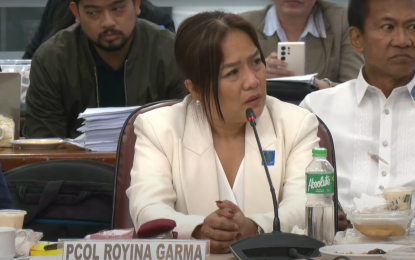
Royina Garma, former Philippine Charity Sweepstakes Office general manager and retired police colonel (File photo)
MANILA – Former Philippine Charity Sweepstakes Office (PCSO) general manager and police colonel Royina Garma said a task force under the leadership of retired Col. Edilberto Leonardo at the Criminal Investigation and Detection Group in Davao City (CIDG-11) played a pivotal role in the reward-based drug war of the Duterte administration.
According to a news release on Monday, Garma revealed in her sworn affidavit submitted to the House quad committee that financial incentives between PHP20,000 and PHP 1 million motivated extrajudicial killings (EJKs) over arrests.
Garma testified that the anti-drug campaign of the previous administration followed direct orders from then-president Rodrigo Duterte, with Senator Christopher Go and Leonardo playing key roles in its implementation.
Leonardo has stepped down as commissioner of the National Police Commission (Napolcom).
Leonardo, then chief of CIDG-Region 11, organized a select group of operatives to implement the drug war based on the "Davao Model," which was allegedly developed during Duterte's tenure as mayor wherein police officers were rewarded for killing drug suspects.
Among the core operatives were Rommel Bactat, Rodel Cerbo, Michael Palma and Lester Berganio, who were all former police officers stationed at the CIDG office, according to Garma.
“They were discharged from service about a year ago due to an operation that led to the killing of one individual,” she said.
Garma said Berganio maintained detailed lists of suspected drug suspects.
Information collected by the operatives were passed to Leonardo, who determined the level of operation and assigned corresponding rewards.
“Rewards were only given for killings, while for arrests, only the funding of the COPLAN (case operation plan) and a refund for the expenses was given,” Garma said.
Garma further revealed that financial operations supporting the task force were managed by Peter Parungo, a former detainee cleared of a rape charge.
Parungo allegedly processed all funds for COPLAN, including reimbursements for operational expenses and rewards for agents, through accounts at major Philippine banks.
“All COPLAN funds, refunds for operational expenses, and rewards for agents were processed through the bank accounts of Peter Parungo at Metrobank, BDO, and PS (Philippine Savings) Bank,” Garma said.
Garma also discussed connections between the drug war and operations within the Bureau of Corrections (BuCor), where high-profile drug lords are imprisoned.
“I was informed that the drug structure originated from BuCor, where numerous drug lords are currently incarcerated, and that it has three branches -- Luzon, Visayas, and Mindanao -- with Peter Lim involved in the Visayas region,” Garma said.
She highlighted that Leonardo's task force coordinated closely with high-ranking officials, including those from the Philippine Drug Enforcement Agency and the Philippine National Police.
Garma testified that Leonardo personally briefed senior officials and reported directly to Go, who was Special Assistant to the President at the time.
Leonardo had control over the task force’s target list, with authority to classify, update, or remove individuals from the list as needed, Garma said.
Garma recounted that in May 2016, or before Duterte assumed the presidency, she was instructed to find a police officer to lead the nationwide implementation of the war on drugs.
She recommended Leonardo, who became a central figure in organizing the nationwide anti-drug campaign.
After Leonardo’s retirement from the police force, Duterte appointed him as Environment undersecretary and to the Napolcom. (PNA)
